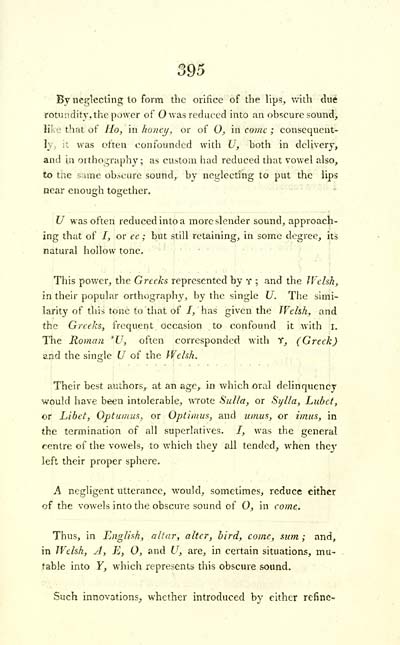Blair Collection > Celtic researches, on the origin, traditions & language, of the ancient Britons
(489)
Download files
Complete book:
Individual page:
Thumbnail gallery: Grid view | List view

395
By neglecting to form the orifice of the lips, v/ith due
rotundity, the power of Ο was reduced into an obscure sound,
like that of Ho, in honty, or of O, in come ; consequent-
ly, it was often confounded with U, both in dchvery,
and in orthography; as custom liad reduced that vowel also,
to the same obscure sound, by neglecting to put the lips
near enough together.
U was often reduced into a more slender sound, approach-
ing that of /, or ee ; but still retaining, in some degree, its
natural hollow tone.
This power, the Greeks represented by γ ; and the iVclsh,
in their populiir orthography, by the single U. The simi-
larity of this tone to that of /, has given the Wehh, and
the Greeks, frequerit occasion to confound it with i.
The Roman 'U, often corresponded with Y^ (Greek)
and the single U of the Welsh.
Their best authors, at an age, in which oral delinquency
would have been intolerable, \vTote Sulla, or St/lla, Lubet,
or Libet, Optumiis, or Optimus, and umus, or imus, in
the termination of all superlatives. /, was the general
centre of the vowels, to which they all tended, when they
left their proper sphere.
A negligent utterance, would, sometimes, reduce either
of the vowels into the obscure sound of O, in come..
Thus, in English, altar, alter, bird, come, sum ; and,
in Welsh, A, E, O, and U, are, in certain situations, mu-
table into Y, which represents this obscure sound.
Such innovations;, whether introduced by cither refine-
By neglecting to form the orifice of the lips, v/ith due
rotundity, the power of Ο was reduced into an obscure sound,
like that of Ho, in honty, or of O, in come ; consequent-
ly, it was often confounded with U, both in dchvery,
and in orthography; as custom liad reduced that vowel also,
to the same obscure sound, by neglecting to put the lips
near enough together.
U was often reduced into a more slender sound, approach-
ing that of /, or ee ; but still retaining, in some degree, its
natural hollow tone.
This power, the Greeks represented by γ ; and the iVclsh,
in their populiir orthography, by the single U. The simi-
larity of this tone to that of /, has given the Wehh, and
the Greeks, frequerit occasion to confound it with i.
The Roman 'U, often corresponded with Y^ (Greek)
and the single U of the Welsh.
Their best authors, at an age, in which oral delinquency
would have been intolerable, \vTote Sulla, or St/lla, Lubet,
or Libet, Optumiis, or Optimus, and umus, or imus, in
the termination of all superlatives. /, was the general
centre of the vowels, to which they all tended, when they
left their proper sphere.
A negligent utterance, would, sometimes, reduce either
of the vowels into the obscure sound of O, in come..
Thus, in English, altar, alter, bird, come, sum ; and,
in Welsh, A, E, O, and U, are, in certain situations, mu-
table into Y, which represents this obscure sound.
Such innovations;, whether introduced by cither refine-
Set display mode to: Large image | Transcription
Images and transcriptions on this page, including medium image downloads, may be used under the Creative Commons Attribution 4.0 International Licence unless otherwise stated. ![]()
| Early Gaelic Book Collections > Blair Collection > Celtic researches, on the origin, traditions & language, of the ancient Britons > (489) |
|---|
| Permanent URL | https://digital.nls.uk/75769274 |
|---|
| Description | A selection of books from a collection of more than 500 titles, mostly on religious and literary topics. Also includes some material dealing with other Celtic languages and societies. Collection created towards the end of the 19th century by Lady Evelyn Stewart Murray. |
|---|
| Description | Selected items from five 'Special and Named Printed Collections'. Includes books in Gaelic and other Celtic languages, works about the Gaels, their languages, literature, culture and history. |
|---|

